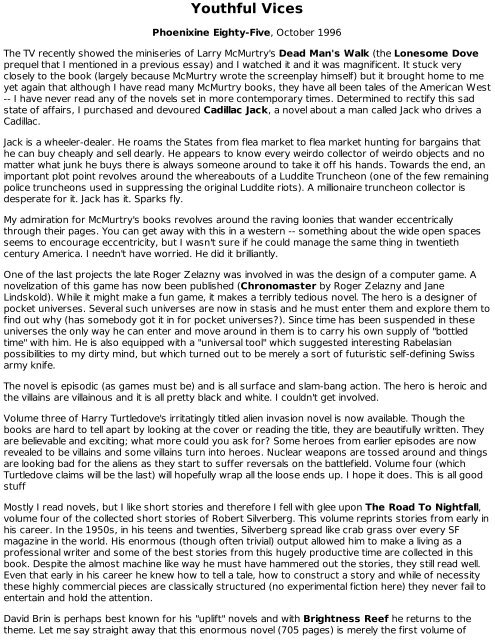Triffids Beard 2 - The Bearded Triffid
Triffids Beard 2 - The Bearded Triffid
Triffids Beard 2 - The Bearded Triffid
You also want an ePaper? Increase the reach of your titles
YUMPU automatically turns print PDFs into web optimized ePapers that Google loves.
Youthful Vices<br />
Phoenixine Eighty-Five, October 1996<br />
<strong>The</strong> TV recently showed the miniseries of Larry McMurtry's Dead Man's Walk (the Lonesome Dove<br />
prequel that I mentioned in a previous essay) and I watched it and it was magnificent. It stuck very<br />
closely to the book (largely because McMurtry wrote the screenplay himself) but it brought home to me<br />
yet again that although I have read many McMurtry books, they have all been tales of the American West<br />
-- I have never read any of the novels set in more contemporary times. Determined to rectify this sad<br />
state of affairs, I purchased and devoured Cadillac Jack, a novel about a man called Jack who drives a<br />
Cadillac.<br />
Jack is a wheeler-dealer. He roams the States from flea market to flea market hunting for bargains that<br />
he can buy cheaply and sell dearly. He appears to know every weirdo collector of weirdo objects and no<br />
matter what junk he buys there is always someone around to take it off his hands. Towards the end, an<br />
important plot point revolves around the whereabouts of a Luddite Truncheon (one of the few remaining<br />
police truncheons used in suppressing the original Luddite riots). A millionaire truncheon collector is<br />
desperate for it. Jack has it. Sparks fly.<br />
My admiration for McMurtry's books revolves around the raving loonies that wander eccentrically<br />
through their pages. You can get away with this in a western -- something about the wide open spaces<br />
seems to encourage eccentricity, but I wasn't sure if he could manage the same thing in twentieth<br />
century America. I needn't have worried. He did it brilliantly.<br />
One of the last projects the late Roger Zelazny was involved in was the design of a computer game. A<br />
novelization of this game has now been published (Chronomaster by Roger Zelazny and Jane<br />
Lindskold). While it might make a fun game, it makes a terribly tedious novel. <strong>The</strong> hero is a designer of<br />
pocket universes. Several such universes are now in stasis and he must enter them and explore them to<br />
find out why (has somebody got it in for pocket universes?). Since time has been suspended in these<br />
universes the only way he can enter and move around in them is to carry his own supply of "bottled<br />
time" with him. He is also equipped with a "universal tool" which suggested interesting Rabelasian<br />
possibilities to my dirty mind, but which turned out to be merely a sort of futuristic self-defining Swiss<br />
army knife.<br />
<strong>The</strong> novel is episodic (as games must be) and is all surface and slam-bang action. <strong>The</strong> hero is heroic and<br />
the villains are villainous and it is all pretty black and white. I couldn't get involved.<br />
Volume three of Harry Turtledove's irritatingly titled alien invasion novel is now available. Though the<br />
books are hard to tell apart by looking at the cover or reading the title, they are beautifully written. <strong>The</strong>y<br />
are believable and exciting; what more could you ask for? Some heroes from earlier episodes are now<br />
revealed to be villains and some villains turn into heroes. Nuclear weapons are tossed around and things<br />
are looking bad for the aliens as they start to suffer reversals on the battlefield. Volume four (which<br />
Turtledove claims will be the last) will hopefully wrap all the loose ends up. I hope it does. This is all good<br />
stuff<br />
Mostly I read novels, but I like short stories and therefore I fell with glee upon <strong>The</strong> Road To Nightfall,<br />
volume four of the collected short stories of Robert Silverberg. This volume reprints stories from early in<br />
his career. In the 1950s, in his teens and twenties, Silverberg spread like crab grass over every SF<br />
magazine in the world. His enormous (though often trivial) output allowed him to make a living as a<br />
professional writer and some of the best stories from this hugely productive time are collected in this<br />
book. Despite the almost machine like way he must have hammered out the stories, they still read well.<br />
Even that early in his career he knew how to tell a tale, how to construct a story and while of necessity<br />
these highly commercial pieces are classically structured (no experimental fiction here) they never fail to<br />
entertain and hold the attention.<br />
David Brin is perhaps best known for his "uplift" novels and with Brightness Reef he returns to the<br />
theme. Let me say straight away that this enormous novel (705 pages) is merely the first volume of


